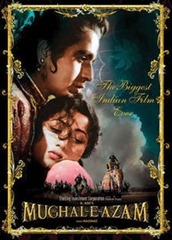Dickens was a clever fellow, wasn’t he? I reckon he hit the nail on the head with the Ghost of Christmas Past. Just as Scrooge was haunted by this Ghost, I too feel the presence of the Ghost of Ramanavami Past all around me today. Is this how it is for everybody? Do we all go through life shaped and then haunted by an unchangeable past and hemmed in by an unpredictable future? I wonder, what past am I creating today? How will it haunt me later?
Thankfully for me, unlike Scrooge’s Ghost, my Ghost only shows me warm and wonderful memories of Ramanavami. From its annals of collective memory, it shows me the joy of Lord Rama’s birth and from my own personal memory, it shows me the joys of celebrations past.
As I pick the song for today I am haunted more than by just Ramanavami. This song has sent me hurling back in time to my school years. Every morning I would be woken by Vividh Bharati’s 6 am devotional music program which featured songs like my choice of the day. I would sip my tea standing on the veranda, watching the sun make its way up the horizon, listening to the songs on the radio accompanied by mum’s voice joining in as she busied herself in the kitchen. She would have woken much earlier, for she would have showered, then finished her half-hour morning puja, made filter-coffee and be well into making lunch. On festival days and holidays, this morning devotional music would be followed by Venkatesha Suprabhatam and Vishnu Sahasranamam on my father’s favourite possession – a Grundig tape recorder that he bought in Germany in the 1960s. For the rest of the festival day, there would be non-stop Carnatic Music.
What a feast my mum would lay out for us! There would be panagam and kosumalli in addition to the festival menu of many dishes with vadai & payasam. How many hours she would have spent in the kitchen! Why don’t I remember thanking her? Forget festivals, did I even thank her for getting up early enough to pack me a cooked lunch everyday? I can’t remember. So after all, I too have a ghost which haunts me –the Ghost of ingratitude, of taking my mother’s love for granted, for were not her meals just edible love?
Today’s song is by the great poet-saint Tulsidas (1532-1623). He extolls Rama’s beauty in wonderful verse, calling him equal to ‘innumerable Cupids’, like a ‘lustrous white lightning in his yellow garments’. The sounds of the words ring as pleasingly as the description of his Lord. For lyrics and translation, see footnote. His prayer is basically for the Lord who is the ‘destroyer of the great fears of life’ to ‘live in the lotus of my heart’. Is that not our prayer too?
So here is the voice which sang so beautifully through my growing years, Lata Mangeshkar, singing Sri Ramachandra Kripalu Bhaja Mana.
For those who are unfamiliar with the life of Tulsidas, there is a Hindi film made in 1954 which is available on youtube with subtitles. Though it does stretch what is essentially quite a short story, I still enjoyed watching it; I do like the innocence of old films.
Footnote (Lyrics) :
श्री रामचन्द्र कृपालु भज मन हरण भव-भय दारुणम् ।
नव-कंज-लोचन कंज-मुख कर-कंज पद-कंजारुणं॥१॥
कंदर्प अगणित अमित छवि नव नील नीरद सुन्दरम् ।
पट पीत मानहु तड़ित रूचि शुचि नौमि जनक सुता वरम् ॥
भज दीन बन्धु दिनेश दानव दैत्य वंश निकन्दनम् ।
रघु नन्द आनंद कंद कोसल-चंद दशरथ नन्दनम् ॥
शिर मुकुट कुण्डल तिलक चारु उदार अङ्ग विभूषणम् ।
आजानु भुज शर चाप धर सङ्ग्राम जित खर दूषणम् ॥
इति वदति तुलसीदास शङ्कर शेष-मुनि मन रञ्जनम् ।
मम हृदय कंज निवास कुरु कामादि खलदल-गंजनं॥
shrI rAmachandra kripAlu bhaja mana haraNa bhava bhaya dAruNam
nava-kanja-lOchana kanja-mukha kara-kanja pada-kanjAruNam
kandarpa agaNita amita chavi nava nIla nIrada sundaram
paTa pIta mAnahu taDita ruchi shuchi naumi janaka sutA varam
bhaja dIna bandhu dinEsha dAnava daitya vansha nikandanam
raghu nanda Ananda kanda kOsala chanda dasharatha nandanam
shira mukuTa kuNDala tilaka chAru udAra anga vibhUshaNam
AjAnu-bhuja shara chApa dhara sangrAma jita khara dUshaNam
iti vadati tulasIdAsa shankara shEsha muni mana ranjanam
mama hrdaya kanja nivAsa kuru kAmAdi khaladala ganjanam
O Mind (mana)! Pray (bhaja) to compassionate (kripAlu) Ramachandra who destroys (haraNa) the great (dAruNa) fears of life (bhava-bhaya). With eyes (lOchana) like a new (nava) lotus (kanja), with a face (mukha) like a lotus (kanja), and feet (pada) like a crimson (aruNa=dawn) lotus (kanja).
With boundless (amita) splendour (chavi) like innumerable (agaNita) cupids (kandarpa), he is as beautiful (sundaram) as a new (nava) blue (implies rain?) (nIla) cloud (nIrada). I bow (noumi) to that groom (varam) of Janaka’s daughter (sutA), who is like (mAnahu) a lustrous (ruchi) white (shuchi) lightning (taDita) in his yellow (pIta) garments (paTa).
I bow (bhaja) to the Sun-like (diNesha) friend (bandhu) of the wretched (dIna), destroyer (nikandanam) of the demons (dAnava & daityA) dynasties (vansha). Son (nanda) of the Raghu dynasty, root (kanda) of joy (Ananda), gladdens (chanda) the Kosalas (his mother’s dynasty), son of Dasharatha.
Beautiful (chAru) with a crown (mukuTa) on his head (shira), earrings (kunDala), and mark on his forehead (tilaka) and limbs (anga) generously (udAra) decorated (vibhUshaNam). With long hands to his knees (AjAnu-bhuja), holding (dhara) a bow (chApa) and arrow (shara) , winner (jIta) of the battle (sangrAma) with khara and dhUshaNa.
Thus (iti) says (vadati) tulasIdAsa. He who pleases (ranjana) the minds (mana) of Shankara and Adisesha (sEsha muni), who has contempt (ganjanam) for the wicked things (khala-dala) like (Adi) desire (kAma), please dwell (nivAsa kuru) in the lotus (kanja) of my heart (hridaya),











